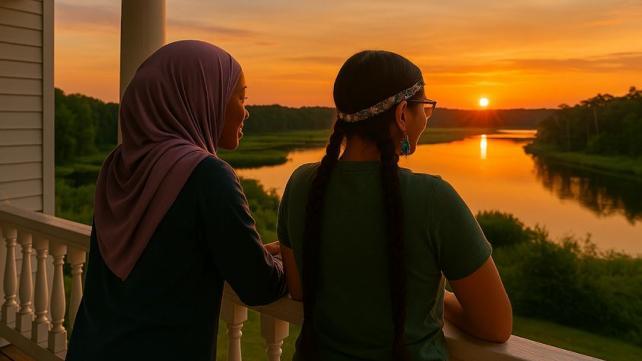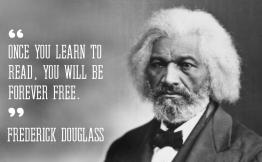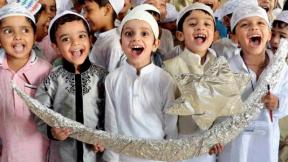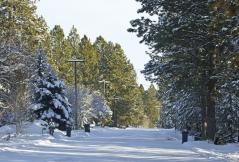
Nakiyah had always loved how Ahoskie, North Carolina, felt at dusk. Cicadas tuned their small fiddles, and the world seemed to hum like a living drum. On those evenings, the porch at her grandparents’ house became a tiny planet. A dented kettle hissed on the stove. Someone always set out chipped cups and a chipped saucer to catch sugar. Her Nana would pour the tea high and carefully. The amber stream threaded steam into the air as if it were a prayer. “One spoon,” Nana would say, though she’d already seen Nakiyah’s hand drifting toward two. “Pure and clean is best.”
Pure and clean. Her name meant that in Arabic, Nana would remind her, tapping the syllables the way she tapped the lid of the sugar jar: Na-ki-yah. Clean, unblemished. “We say that so you remember who you are,” Nana would murmur. “So you keep remembering even when the world wants to make you forget.”
When Nakiyah graduated from high school and was accepted to a small university in Coastal Virginia, near the James River and the Dismal Swamp, it felt like the world was reminding her, too. The family gathered again on the porch before she left. Plates of sweet biscuits and bowls of sliced peaches sweated in the summer heat. Uncles told stories of ancestors who hid out in the Dismal Swamp of blood-kin who had run from chains into cypress shadows, making villages on rafts and in reed-thick banks. The way the elders talked, those dark waters knew their names. Nakiyah had grown up believing her people had been dragged through the ports near Richmond, auctioned and scattered, then stitched back together by stubborn memory and Sunday dinners. Perhaps, she thought, the Swamp had made space for them to remain themselves.
There were other, quieter stories that vibrated under the louder, painful ones, habits she recognized without knowing why. No excessive use of water, and no wasting water. There was a preference for tea over coffee. She remembered the way Nana stood for a breath right after praying. The family always called in the children at the first flick of the streetlights. “Inside now,” the aunties would say as the sky purpled, “just for a bit.” After about an hour, once the last light of sunset slid off the grass and the evening prayer was done, they would let the children drift back outside. Laughter perched on their shoulders.
At the university, the air tasted of salt and pine. The library windows looked east, where the morning unfurled like a silk ribbon over water. On orientation week, in a room that smelled like dry-erase markers and new backpacks, she met a girl whose laughter sounded like water running over stones.
“I’m Nakia,” the girl said, shaking her hand. “Wiggins from Charles City County.”
“Nakiyah,” she replied, smiling. “Bazemore from Bertie County.”
“Cousins, then,” Nakia joked. “At least in syllables.” She grinned, then cocked her head. “We say my name means new beginnings.”
“My Nana says mine means pure, clean, unblemished,” Nakiyah said, tasting the words again.
“Then we match twice,” Nakia said, as if she had been waiting for this moment. “Clean beginnings.”
They began studying together in the anthropology wing, a floor that smelled faintly of dust and old paper and clay. Maps of the Powhatan Nation hung along one hallway, the rivers braiding across the paper like the threads of a blue shawl. The Dismal Swamp glittered green-black, a tangle that had once hidden lives like an elder’s cupped hand.
Over shared notes and cups of cafeteria tea, they compared childhoods like quilt squares. Nakia’s people were river people; her grandmother told stories of sturgeon heaving like silver moons and eelpot’s woven tight. In her house, elders were seated first, served first, and their advice cut a path for everyone else to walk. Nakiyah nodded, hearing her own Nana’s voice: “A house stands because the old keep it upright.”
They signed up for an elective together: “Belief, Kinship, and Land: Comparative Traditions.” The professor, a gentle woman with iron-grey hair and seaglass earrings, encouraged them to bring their whole selves into the classroom. “Your families’ stories are data,” she said, smiling. “And data is sacred, too.”
Their research became a braided river. They stayed up late beneath the library lamps, chasing references like fireflies. They read about maroons (runaways) in the Dismal Swamp. People who made lives from reeds and courage, and how some carried fragments of West African memory into the green hush: songs with half-remembered Arabic syllables; fasting that matched a moon; names that leaned toward the old homelands. They read, too, about the Mattaponi and the Pamunkey, about councils and kinship, prayers offered to the Great Spirit. Then, like a door clicking open inside them, they found testimonies from Native American Muslims who had walked both paths and did not find them at war.
“Listen to this,” Nakia said one evening, pointing to a line on her screen. “‘We, too, have always submitted ourselves to one God, one Creator.’” She looked up at Nakiyah. “That feels like home.”
“One Creator,” Nakiyah said softly. She thought of how her grandfather would sit on the porch at night, gaze tilted toward the invisible stars, whispering, “Alhamdulillah.” Praise to the One who made the crickets sing and the peaches sweet.
Another article led them to a Navajo (Diné) Muslim who spoke about stewardship, that human beings were khalifa, caretakers of the earth, and that this matched the old teaching to walk lightly, to speak to the soil as if it had ears. Nakia nodded so hard her earrings flashed. “My auntie says, ‘The land is your relative,’” she said. “You don’t stomp on your relatives.”
They read about community, too, and the Michif concept of wahkohtowin kinship linking all beings, and how it resonated with the Islamic insistence on the ties of family and neighbor. They mapped it out on a whiteboard with squeaking markers: circles within circles, strings between them. “Wahkohtowin,” Nakiyah whispered, letting the foreign word sit beside the Arabic ones she knew: ummah, jama‘ah, silat ar-rahim. Family, congregation, the stitching of kin.
They talked about honoring elders, a value that wrapped both their lives as snug as a shawl. They found hadith about honoring parents, verses that braided gratitude with obedience. Nakia brought in her grandmother’s teaching: never walk in front of your elders without saying where you’re going, never sit in a council without offering them the first word. The girls practiced it even in the classroom, pausing to invite the older students to speak first, smiling at one another when they got it right.
And they found the echoes in practice, prayer, and fasting rippling across traditions. One testimony from an Ojibwe Muslim woman described how her people left tobacco offerings throughout the day, mindful across the hours; it made Nakiyah think of the five daily prayers, the way the day was knotted by brief prostrations that turned your face back to Allah. Another account spoke of fasts that were kept in certain seasons, not entirely unlike Ramadhan. They looked up from their notebooks, eyes shining with the thrill of recognition: different paths, but similar trails.
Of course, research was not the same as proof, and the girls were careful not to fit history to their hope like an extra medium-sized coat. The archives offered gifts and guarded secrets. Some nights, it felt like the past breathed near them, warm and close; other nights, the records were a fog. But even uncertainty felt like gratification when they held it together.
On weekends, they drove south to Ahoskie or north to the Mattaponi Reservation, trading turns behind the wheel of Nakia’s old sedan, the windows down so the river air could wash over them. In Ahoskie, Nana made tea and asked Nakia many inquisitive questions about her people and customs, eyes soft as moss. Nakia’s grandmother later returned the favor, placing a hand on Nakiyah’s shoulder and telling her, “You carry your people’s light, child.” The grandmothers sat together, comparing gardens and granddaughters, and medicine for aching knees. The two girls watched, full of a reverence that made them quiet.
One evening, after sunset, the families gathered in the yard. The children had been called in at the first bright flick of the streetlights, just for a bit, just until the thin line between day and night had settled, and then sent back out after the evening prayer. They ran now like comets, streaking the air with laughter. Nakia leaned on the porch rail, shoulder to shoulder with Nakiyah. “It’s the same rhythm,” she said softly. “Different drums, same rhythm.”
Nakiyah thought about her own drum: the call inside that drew her to wash her hands and face, to stand and bow, to bend her forehead to the earth. She thought about the Swamp, which had hidden people and held them safe. About the James River, which had carried canoes and cargo and perhaps even whispered prayers. She thought about the Great Spirit being One. And she reflected on how Allah is The One and Only.
Say (O Muhammad (Peace be upon him)): "He is Allah, (The) One.
"Allah-us-Samad (The Self-Sufficient Master, Whom all creatures need, He neither eats nor drinks).
"He begets not, nor was He begotten;
“And there is none coequal or comparable unto Him."
In the fall, they declared their majors: Anthropology, both of them. Their advisor laughed and clapped her hands. “Co-researchers,” she said. “Co-authors.” The girls grinned at each other, already imagining fieldwork in cypress shade, interviews with elders on porches, collaborative projects that honored both tides and texts.
At the end of the semester, they presented a joint paper: “Convergences of Devotion and Kinship: Echoes Between Powhatan Traditions and Islam Near the Dismal Swamp.” They were careful, respectful, and open-handed. They offered stories, not certainties; invitations, not conclusions. When they finished, the room was quiet for a breath. Then an old man in the back, auditing the class, a veteran with a face like carved stone, raised his hand. “You girls remind me,” he said, “that the truth’s got more rooms than any one of us can sleep in.” His smile cracked into something tender. “Keep walking the hallway.”
That night, back at the dorm, Nakiyah lay awake and listened to the distant hush of the river, to the wind threading itself through pine. She thought of Nana’s tea, of Nakia’s grandmother’s hands, of the rule about the streetlights and the way the world felt settled once the evening prayer was done. She thought about names that matched like puzzle pieces: clean beginnings.
She did not know what the next years would place in their hands: family documents unearthed from trunks; elders who would tell forgotten tales; archives that would open, a page at a time, like lilies. She did not know the shape of proof, whether it would look like a ledger or a lullaby. But she felt the soft certainty that there was One Who Knew, One Who had written their paths in ink that did not smudge.
“Allah knows best,” she whispered into her pillow, and in the dark she could hear the river answering, a sound like pages turning.








Add new comment